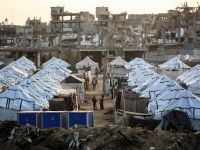World AIDS Day unfolded Friday to appeals for a relentless effort against a virus that has scythed through southern Africa, has Asia firmly in its sights and could revive among rich nations able to buy costly anti-viral drugs.
Setting a grim tone, US President Bill Clinton declared the AIDS virus a menace to world security and renewed America's vow to fight it.
"Because the spread of HIV has reached catastrophic proportions in many areas of our global community, AIDS has become a national and international security threat," Clinton said.
"We reaffirm our shared commitment to carry on the fight until our battle against this devastating disease is won."
Some 5.3 million people became infected with HIV in 2000, bringing to 36.1 million the number of people estimated to have HIV or AIDS worldwide by the end of this year, according to the World Health Organization (WHO) and UNAIDS.
By the far the biggest-hit region is sub-Saharan Africa, accounting for 70 percent of the tally.
But experts say they are also alarmed at explosive growth of the pandemic in Eastern Europe, especially Russia, and the potential for human devastation in India and China.
An editorial in the official Beijing newspaper China Daily on Friday said the number of confirmed HIV or AIDS cases in the world's most populous country stood at 20,711 in a population of 1.3 billion.
But, it added, specialists put the real figure at a conservative 500,000 at the end of last year.
"China is on a fast track to having a big epidemic," said Edwin Judd, China representative at the United Nations Children's Fund (UNICEF).
"Unless there is really substantial action in the next three or four years the real danger is that we will have 10 million cases of HIV or AIDS in the year 2010 or worse," he added.
Vietnam, one of the worst-affected countries in Asia along with Cambodia, China and Myanmar, made a public display of its determination to fight the pandemic.
About 20 pink buses decorated with condoms and red ribbons took to the streets of Hanoi and Ho Chi Minh City, handing out condoms and information pamphlets to passers-by.
The buses will spend the next two days cruising the streets, stopping outside karaoke bars and other nightspots which are transmission point for the human immunodeficiency virus (HIV).
In Thailand, a country credited by AIDS experts for working quickly and aggressively against the disease, there was a series of low-key educational events, replacing the street parades, floats and banners of previous years.
The focus was on poor rural areas, where AIDS awareness is low.
"HIV-AIDS is not a new issue in Thailand. In the past, people needed to be informed in terms of prevention," said UNAIDS country program adviser Sompong Chareonsuk.
"Now, the focus is more on care and support, for people living with HIV-AIDS for example, and targeting specific groups of people for prevention." In the former Soviet Union, HIV infections have risen in the past year from 420,000 to 700,000, 300,000 of them in Russia, where it is mainly proliferating thanks to intravenous heroin use, according to UNAIDS.
In the United States, Britain, France and other rich countries, expensive "triple cocktails" of anti-HIV drugs, which suppress the virus but do not eradicate it, have helped to brake the spread of the disease.
But authorities fear that the very success of these medications may have helped to breed complacency.
Britain's Public Health Laboratory Service warned Friday that the number of people diagnosed with HIV could rise to 29,000 by the end of 2003, an increase of 40 percent over the toll at the start of this year -- PARIS, Dec 1 (AFP)
© 2000 Al Bawaba (www.albawaba.com)







